
Does The BBC Need to Get Off the Fence About Artificial Grass?
As I finally come down from the excitement of my two minutes and nine seconds of fame on BBC Gardener’s World, I thought I would reflect on, and share with you, the long and complicated process that led to the nine-minute segment on the pros and cons of artificial grass, and my thoughts on how the BBC handled it.
First of all, I want to say how grateful I was to get a chance to speak about this hugely important topic on behalf of my thousands of fellow anti plastic grass campaigners. Thank you to the wonderful and dedicated employees of Gardener’s World, who were as passionate about this subject as I was. Their tenacity made this segment happen – despite, what I can imagine, was some stiff opposition!
Last spring, I was approached by Gardener’s World to help them with a piece on artificial grass, or as I prefer to call it, ‘Devil’s Carpet’. Those of you who know me, know that I have been campaigning for a ban on plastic grass for five years. This was the big break we campaigners have all been dreaming of. We were thrilled. I remember telling myself “Charlotte don’t f*ck this up, we need to get this toxic turf banned, and this is a great platform to get the message across, possibly the best. Two million people will get to hear our message and hear the truth about this awful stuff.“
According to the BBC though, for some reason, the subject of whether to encase your garden in plastic is a controversial matter… okaaay?? I’ve got news for you, it’s not complicated for most people, in fact it’s quite simple. This ersatz grass is a complete anathema and has no place replacing real lawns. If you want more details why, you can read my report here.
Don’t get me wrong, I totally understand the position Aunty Beeb is in, it has to show due diligence and be fair and impartial, while Informing, Educating and Entertaining. So, in order to inform and educate, I duly supplied the researchers with reams of information and scientific studies done by people far cleverer than me. Every fact was double and triple checked for accuracy, there were many, many phone calls, emails and WhatsApp messages. Eventually after a year, the powers-that-be finally gave the green light.
The next hurdle was finding a location. Inspired by my appearance kneeling in a plastic garden on Channel 4 and BBC News last year, the production team were keen to get me back on all fours, scraping around at the lifeless soil and aggregate beneath the layer of plastic grass.
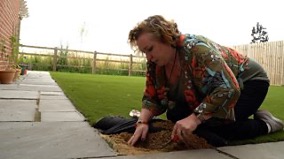
But, as you can imagine, plastic grass owners weren’t keen to have me crawling around in their garden while telling them their choice to carpet their garden in petrochemicals was an epically bad one. Eventually, the lovely Bryony from Wiltshire agreed to let GW use her garden, her and her partner had bought their home with this ghastly astroturf and wanted it gone.
The day of filming finally dawned, I carefully chose my wardrobe, making sure that everything I wore was eco-friendly, ethical and sustainable, which wasn’t hard because nearly everything I own is. In this eco warrior game you cannot be seen to be putting a foot wrong. If you do, an army of ‘Whatabouters’ will be on you like a tonne of bricks, as I know to my cost. I was once told that by being overweight I was destroying the planet, unfortunately I was unable to lose three stone in time for filming in order to appease my haters.
I’ve done a lot of telly in my time, but I was surprised to see how low-key it was: just a cameraman and sound guy. The lovely Jess, who I had been supplying information to for months, was director and producer. No lights or cables just a camera, boom mic and monitor. Technology is good now isn’t it? It’s good to know the BBC are careful with our money, (for the record I was not paid, not even expenses, I was happy to do this). Not long after me, the presenter Arit Anderson arrived. She was friendly and professional and knew her stuff, we both grimaced when we were told we’d be spending the next two hours sat on a wet, plastic carpet. She told me how she had once laid the stuff for clients, but would never do it now.
Within minutes of us plonking ourselves on the lurid, green, petrochemical swathe, the heavens opened, and I, in my thin, boiled wool coat was soon drenched to the skin and I looked like a drowned rat. I looked enviously at everyone’s plastic macs, “Maybe sometimes plastic has a purpose.” I thought. But then I had a word with myself about putting my own convenience and physical appearance before the planet.
After many takes, from every conceivable angle and distance, wherein I had to try and repeat what I had just said (something my ADHD brain finds very hard), we were finally done, and we coaxed our numb legs back into action to retreat to Bryony’s warm home for a cuppa. Arit carries around her own herbal tea bags just like me! Anyway, that was me done; the crew were off to Sheffield University to interview my hero, Professor Ross Cameron, whose studies on green walls helped me with my RHS Master’s degree dissertation on Living Walls. Ross illustrated his excellent research on the importance of biodiversity in gardens by using jars of colourful sweeties, vs dull and boring sweeties, which wrapped up the piece beautifully. You can find out more about Ross here.
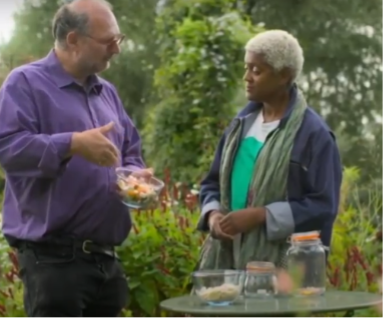
In the interests of balance, Gardener’s World wanted to hear the side of a plastic carpet fitter. “WHAT???” I hear you exclaim, “This is a gardening programme, not an advert for carpet fitters”. But I was not perturbed, “Bring them on!” I said. I could counter whatever they say to try and justify their microplastic shedding, PFAS chemical leaching, abomination. With great excitement in GW Towers, Anthony Gallagher, the manging director of Sleazigrass, sorry I meant Easigrass (my finger slipped) was duly enlisted to sell the benefits of his product.

I was only disappointed I was not able to meet him face-to-face for a round table discussion, maybe he’s scared of me? He and his company have, after all, blocked me on all social media channels. Like the true salesman he is, he made a valiant attempt to sell his tacky turf. I have been asked By the BBC not to tag them or Arit in this still, so I’ll leave the caption to you…
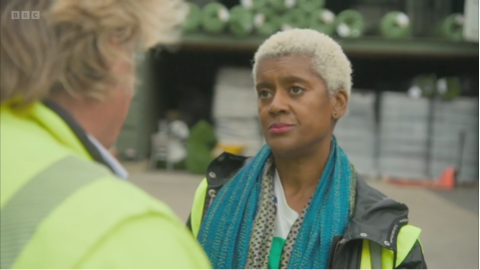
But his blatant greenwashing evidently did not wash with the general public. A brief look at Twitter/ X will show you that not a single person bought his spiel.

![I think Easigrass ppl [sic] twist the facts. Well drained to them means "I'm alright Jack but I'm going to shed water to all the adjacent properties rather than contribute to flood mitigation with organic matter aka self self self."](/blog/BBC-artificial-grass/twitter-2.jpg)
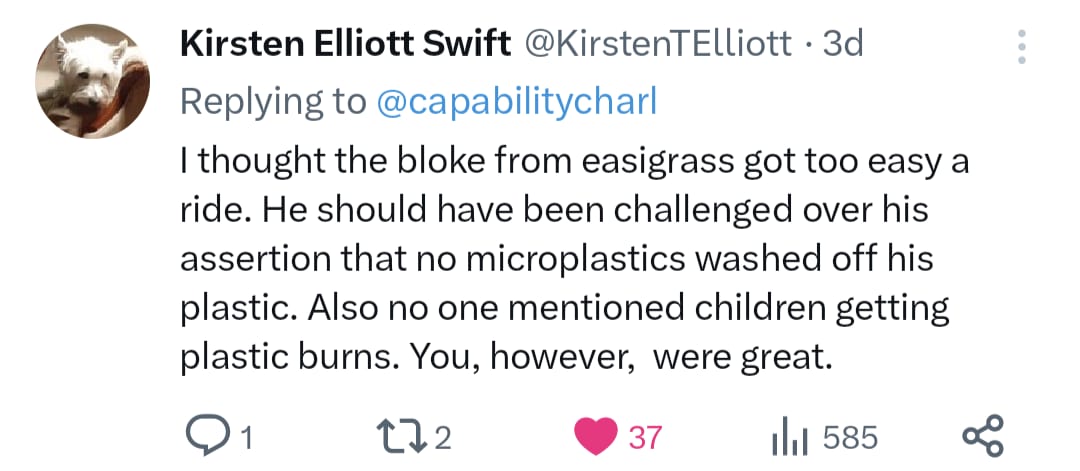
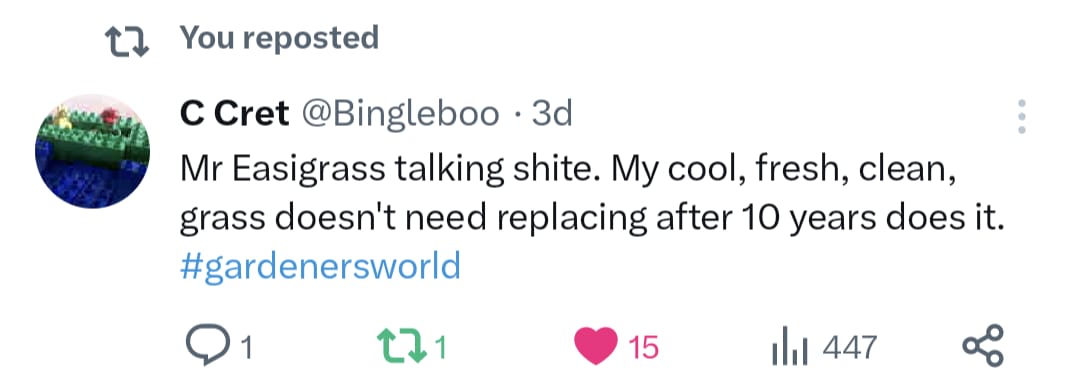
Unfortunately, I was not able to have my segment after his in order to counter his arguments, nor was I able to know what he said. But thankfully, I was asked the right questions by Arit, so my answers, combined with the studies that the show shared, were able to debunk all his sales techniques. He did not come off well in the court of public opinion.
Here are some of the studies they mentioned:
- 1 in 10 households have carpeted their garden
- The contribution of artificial turf to urban flooding
- The contribution of artificial turf to urban heat island effect (even Mr Gallagher agreed his product gets hot)
- And probably worst of all, proof that micro plastics from artificial turf pollute the rivers and seas
The big day dawned. Glass of wine poured, I sat with anticipation to see what presenter and national treasure, Monty Don, would say in his wrapping-up comments about fake grass. I was hugely disappointed, he seems to have changed his mind. Back in May, he spoke openly about his hatred of the stuff in a Times article, where he was quoted as saying:
Plastic grass is an aberration. If I were king, I would outlaw it.
But his BBC approved words were less forthright:
Well, I think that artificial grass, like everything in life, is complicated and there’s no straight forward, easy answer.
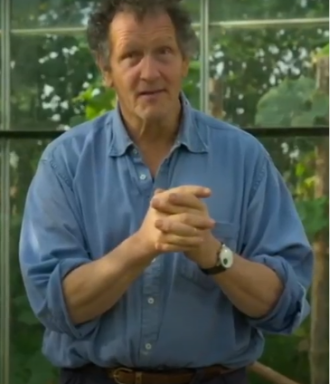
Yes, there is, BAN IT!
While I understand the BBC is in a difficult position and needs to be seen to be impartial, I was hugely disappointed to see that they wouldn’t take a stance on this. Gardener’s World and Monty Don have taken a stance on peat and on plastic pots, hell, even in this very episode, Monty managed to display a snobbish dislike of begonias, yet he wouldn’t speak out against this abomination. In this climate emergency, the BBC missed a wonderful opportunity to help us effect a real and tangible change by supporting a very simple request to ban plastic grass. To use a gardening analogy, this low hanging fruit is a much quicker fix than many other, more complex changes, we need to make to save our beautiful planet.
You can watch the full programme here on iPlayer.
